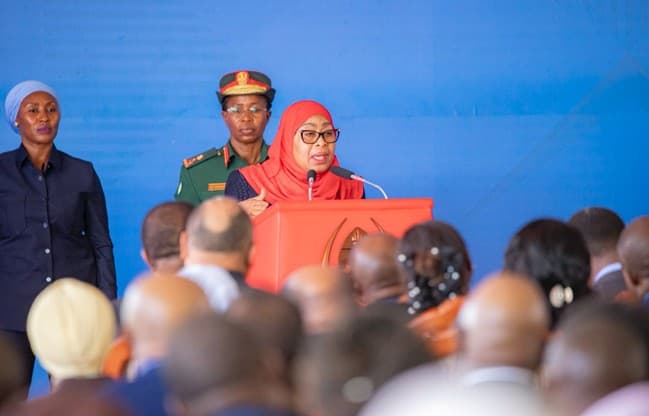We're loading the full news article for you. This includes the article content, images, author information, and related articles.
President Samia Suluhu Hassan’s appointment of her daughter and son-in-law to cabinet positions puts a spotlight on governance trends, while recent investigations in Kenya challenge narratives of a clean slate.

A significant cabinet reshuffle by Tanzanian President Samia Suluhu Hassan on Monday, 17th November 2025, EAT, has ignited a fierce debate on nepotism and governance across the East African region. In a televised address from Chamwino State House in Dodoma, President Hassan appointed her daughter, Wanu Hafidh Ameir, as Deputy Minister of Education, and her son-in-law, Mohammed Mchengerwa, as the new Minister for Health. The appointments also included Ridhiwani Kikwete, son of former President Jakaya Kikwete, who was named Minister for Public Service Management and Good Governance.
The move immediately drew criticism from opposition figures and civil society groups in Tanzania, who have accused the administration of consolidating power within a close circle and undermining meritocracy in public service. Critics argue that placing family members in key ministries could weaken institutional checks and balances and promote dynastic politics, a charge that comes shortly after a contentious election that saw President Samia secure a second term.
These appointments are not isolated incidents in the region. In neighbouring Uganda, President Yoweri Museveni’s government has long included family members in high-ranking positions, including his wife Janet Museveni as Minister for Education and his son, General Muhoozi Kainerugaba, as the head of the defence forces. This regional pattern raises critical questions for Kenya about the standards of governance and the line between rewarding loyalty and practicing nepotism.
The developments in Tanzania have been contrasted with the situation in Kenya, where some commentators have noted President William Ruto has avoided appointing immediate family members to his cabinet. However, a deeper look reveals a more complex picture. A November 2025 investigation by the New York Times alleged that a compulsory insurance program for Kenyan migrant workers is dominated by a company majority-owned by First Lady Rachel Ruto and one of their children, a firm that has reportedly collected millions in premiums without paying out any claims. The report also claimed that recruitment agencies linked to senior government officials profit from the export of labour to the Gulf, a trade often marked by severe worker exploitation. President Ruto's office declined to provide a detailed response to the allegations when queried by the newspaper.
Furthermore, while direct relatives may be absent from the cabinet, questions of cronyism and favouritism persist. Kenya's Ethics and Anti-Corruption Commission (EACC) has consistently flagged nepotism as a rampant problem within the public sector. A 2024 EACC survey identified favouritism, tribalism, and nepotism as among the leading forms of unethical conduct experienced in public service. A separate EACC report released on Thursday, 13th November 2025, highlighted systemic corruption and favouritism within the National Police Service, noting that recruitment and deployment are often influenced by bribery and family relations rather than merit.
While the Tanzanian appointments provide a clear example of familial ties in high office, broader governance indicators show that both Kenya and Tanzania face significant, deeply entrenched challenges with corruption. The 2024 Corruption Perceptions Index (CPI), released in February 2025 by Transparency International, showed minimal progress for both nations. Kenya scored 32 out of 100, a marginal improvement from 31 the previous year, while Tanzania scored 41, also a one-point increase from 40. Both scores are below the global average of 43 and the Sub-Saharan Africa average of 33, indicating serious levels of perceived public sector corruption.
According to Transparency International Kenya's Executive Director, Sheila Masinde, a one-point improvement is insufficient, stating that Kenya continues to struggle with deep-rooted corruption that undermines service delivery. Similarly, reports from Kenyan civil society groups like The Institute for Social Accountability (TISA) point to systemic issues. A May 2025 report titled "Stealing the Future" highlighted the plunder of public resources and ballooning debt as critical threats to the nation's future. Surveys conducted by groups under the Kenya Devolution Working Group in March 2024 also found that Kenyans remain deeply unhappy with the levels of corruption, nepotism, and cronyism within county governments, which they see as a primary obstacle to service delivery.
The recent events in Tanzania serve as a critical moment of reflection for the entire East African Community. As leaders navigate the complex interplay of political loyalty, family, and public service, the demand for transparent, accountable, and merit-based governance remains a paramount concern for citizens across the region. The focus now shifts to whether these high-profile appointments will trigger substantive reforms or further entrench patterns of patronage that hinder economic and social progress.
Keep the conversation in one place—threads here stay linked to the story and in the forums.
Sign in to start a discussion
Start a conversation about this story and keep it linked here.
Other hot threads
E-sports and Gaming Community in Kenya
Active 9 months ago
The Role of Technology in Modern Agriculture (AgriTech)
Active 9 months ago
Popular Recreational Activities Across Counties
Active 9 months ago
Investing in Youth Sports Development Programs
Active 9 months ago
Key figures and persons of interest featured in this article